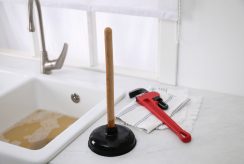If your landlord won’t return your security deposit, you have several options. You can negotiate with them or take them to court. You can document the damages and take photographs to help your case. You can also take them to small claims court. You will need to bring the following: letter from your landlord proving the change in your address, list of things you moved into the apartment, and a few witnesses. If you have photos of the apartment, those may also be helpful.
Taking a landlord to court
If a landlord won’t return your deposit, you can take him or her to court to get your money back. The process starts by filing a complaint. Make sure to write a complaint in plain English and include any evidence you have, such as the lease or photographs of the apartment. In the complaint, ask for your security deposit back and possibly punitive damages. The judge will then determine whether your case is meritorious and will likely result in a judgment.
The process of taking a landlord to court is relatively simple. You don’t need an attorney to file a small claims lawsuit, and the court clerks will be able to provide you with important procedural information. You’ll also need copies of rent receipts and witnesses who can testify to the damage to the property.
Once you’ve written the demand letter, the landlord has two options: first, you can take the case to conciliation court in the county where your rental property is located. If you’re successful, the landlord must explain their actions in court. If you’re unable to reach an agreement with the landlord, you can seek double or triple your deposit at the court.
Alternatively, you can file a small claims court suit in your state. The court process can take several months, and in many larger cities, it can take up to six months. Remember to have a signed lease with your landlord and proof of the condition of the apartment when you moved in.
The Consumer Financial Protection Bureau can also investigate your complaint. The bureau can then meet with the landlord and the tenant. However, you don’t have to agree with the landlord to get your security deposit back. You can refuse if you think it is unfair or unjust.
The purpose of a security deposit is to ensure that you leave the apartment in good condition, have working keys, and haven’t left any unpaid utility bills. If your landlord fails to follow this rule, you may need to sue him or her in order to get your money back.
Negotiating with your landlord
If you’ve been told that your landlord won’t return your deposit, there are a few steps you can take to get the money back. First, you should write a demand letter to your landlord, stating your legal rights and what you want. Also, you should state that you intend to file a lawsuit in small claims court if your landlord doesn’t return your deposit.
Often, tenants expect to receive their entire security deposit back when they move out. However, landlords don’t want to return the full deposit, and will keep part or all of it to cover costs such as damaged property or unpaid bills. Security deposits are supposed to cover any costs associated with renting a property, so if you leave the property in a mess or don’t pay rent, the landlord will be able to keep some or all of it.
If you have difficulty contacting your landlord, consider writing a demand letter asserting your right to the deposit. In the letter, cite relevant state laws and include a deadline to respond. If you’re unable to reach the landlord, you can also mention that you will take legal action if your landlord doesn’t return your deposit.
Before you decide to start negotiations with your landlord, make sure you check your lease agreement carefully. There may be clauses in the contract that require you to leave the premises before the end of the term. This way, you’ll be able to get a quicker return of your security deposit.
Documenting damage

If you have a damaged apartment and you think your landlord will not return your deposit, you have to document all of the damages as soon as possible. To do this, you should take pictures and video of the damaged areas. Take pictures of cracked windows and worn carpet, and document the general wear and tear. You can also include this information in your lease agreement. This will ensure that you’re not responsible for any damages that you didn’t discover before moving in. Also look into getting end of tenancy cleaners Wimbledon area to tidy the place as best as they can to prevent further problems.
Depending on the state you live in, your landlord may be able to keep part of your security deposit. However, it is illegal in many states to use your security deposit as the last month’s rent. Even if your landlord will return your deposit, you may still be responsible for any damages that are not covered by your deposit. Therefore, when you move in, do a thorough walk-through with the landlord, and take photos of any damaged areas. If your landlord doesn’t return your deposit, you should ask for a copy of the receipts so that you can show your landlord that you left the apartment in poor condition.
If your landlord won’t return your deposit, you should consider filing a lawsuit in small claims court. This type of lawsuit is designed to be simple, so you don’t need a lawyer to file a claim. Make sure to gather as much proof as possible, including photos or videos of the damaged area, copies of your lease and rent receipts, and the names and addresses of any witnesses who witnessed the damages.





